Mariana Acevedo Nuevo
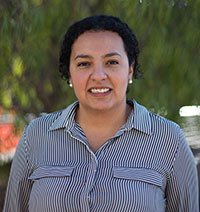
Mariana Acevedo Nuevo is a clinical supervising attorney in the New Business Community Law Clinic. Prior to joining the clinic, Nuevo was the Shriver Housing Attorney at Legal Access Alameda, a local nonprofit. There, she worked as an advocate for housing rights for low-income residents in Alameda County.
Before moving to the United States, Nuevo represented clients before the Mexican Economic Competition Commission. Among her clients were Latin America’s leading e-commerce technology company and one of Mexico’s top five busiest container ports.
After completing her LL.B. at the Instituto Tecnologico de Mexico in 2015, Nuevo worked at the Federal Economic Competition Commission in the Market Investigations unit. During law school, she was a volunteer and then the director of a student organization devoted to promoting economic development in marginalized communities.
Mariana holds an LL.M. from Berkeley Law and a master’s in public policy and public administration from the Centro de Investigacion y Docencia Economicas (CIDE).
Emilie Aguirre
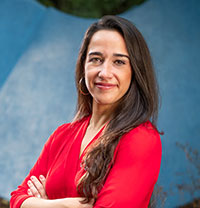 Emilie Aguirre is an associate professor of law at Duke Law School. She also holds a secondary appointment at Duke’s Fuqua School of Business. Professor Aguirre is a scholar of business law and organizational theory. Her research focuses on companies that pursue both social and financial goals. It draws from a range of field research methods, including ethnography, interviews, and surveys. Professor Aguirre was previously the Earl B. Dickerson Fellow at the University of Chicago Law School, an Academic Fellow at the Resnick Center for Food Law and Policy at UCLA School of Law, and a Fulbright scholar at the Centre for Diet and Activity Research (CEDAR) at the University of Cambridge. She received her Ph.D. in Health Policy and Management from Harvard Business School and Harvard Graduate School of Arts & Sciences and her J.D. from Harvard Law School. Professor Aguirre also holds an LL.M. from the University of Cambridge and an A.B. summa cum laude from Princeton University.
Emilie Aguirre is an associate professor of law at Duke Law School. She also holds a secondary appointment at Duke’s Fuqua School of Business. Professor Aguirre is a scholar of business law and organizational theory. Her research focuses on companies that pursue both social and financial goals. It draws from a range of field research methods, including ethnography, interviews, and surveys. Professor Aguirre was previously the Earl B. Dickerson Fellow at the University of Chicago Law School, an Academic Fellow at the Resnick Center for Food Law and Policy at UCLA School of Law, and a Fulbright scholar at the Centre for Diet and Activity Research (CEDAR) at the University of Cambridge. She received her Ph.D. in Health Policy and Management from Harvard Business School and Harvard Graduate School of Arts & Sciences and her J.D. from Harvard Law School. Professor Aguirre also holds an LL.M. from the University of Cambridge and an A.B. summa cum laude from Princeton University.
Roxanna Altholz
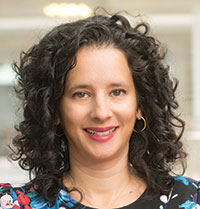 Roxanna Altholz is a clinical professor of law, co-director of the International Human Rights Law Clinic, and faculty co-director of Clinical Program at Berkeley Law. She is an international human rights lawyer and scholar with extensive experience in international and national fora. Altholz has won several ground-breaking judgments from the Inter-American Court of Human Rights, provided expert testimony before UN human rights groups, and initiated legal actions on behalf of human rights victims in U.S. federal courts. She has also developed advocacy and research initiatives to address human rights violations suffered by asylum seekers and migrants at the U.S.-Mexico border, to examine the human rights impacts of unsolved murders in Oakland, and to understand accountability mechanisms for private companies receiving international financing.
Roxanna Altholz is a clinical professor of law, co-director of the International Human Rights Law Clinic, and faculty co-director of Clinical Program at Berkeley Law. She is an international human rights lawyer and scholar with extensive experience in international and national fora. Altholz has won several ground-breaking judgments from the Inter-American Court of Human Rights, provided expert testimony before UN human rights groups, and initiated legal actions on behalf of human rights victims in U.S. federal courts. She has also developed advocacy and research initiatives to address human rights violations suffered by asylum seekers and migrants at the U.S.-Mexico border, to examine the human rights impacts of unsolved murders in Oakland, and to understand accountability mechanisms for private companies receiving international financing.
Prior to teaching at Berkeley, Altholz served as a legal advisor for the United Nations Mission in Kosovo (1999-2000) and a staff attorney at the Center for Justice and International Law (CEJIL) in Washington, D.C. (2000-2005). At CEJIL, Altholz handled a docket comprised of approximately 40 cases involving massacres, extrajudicial killings, torture, disappearances, and discrimination in the United States, Colombia, Guatemala, Dominican Republic, and Ecuador before the Inter-American human rights system.
Altholz’s most recent publications include, “Living with Impunity: Unsolved Murders in Oakland and the Human Rights Impact on Victims’ Family Members,” “Dam Violence: The Plan to Kill Berta Cáceres,” and “Chronicle of A Death Foretold: The Future of U.S. Human Rights Litigation Post-Kiobel,” appeared in the California Law Review (2014). She is the recipient of the 2013 UC Berkeley Law Young Alumni Award and the 2013 UC Berkeley’s Foundation for Change Thomas I. Yamashita Prize.
Stephanie Campos-Bui
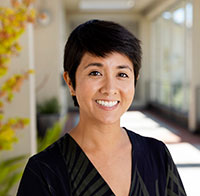
Stephanie Campos-Bui is an assistant clinical professor of law and co-director of the Policy Advocacy Clinic at Berkeley Law where she supervises interdisciplinary teams of law and public policy students in the pursuit of non-litigation strategies to address systemic racial, economic, and social injustice.
Stephanie’s research and advocacy focuses on the impact that fees, fines, restitution, and bail have on communities of color. She has co-authored several reports including High Pain, Low Gain: How Juvenile Administrative Fees Harm Low-Income Families in Alameda County, California(opens in a new tab) (2016), Making Families Pay: The Harmful, Unlawful, and Costly Practice of Charging Juvenile Administrative Fees in California (2017), Fee Abolition and the Promise of Debt-Free Justice for Young People and their Families in California (2019), and Coming Up Short: The Unrealized Promise of In re Humphrey (2022). Stephanie has worked in coalition with community groups across multiple states on successful fee and fine abolition campaigns in the juvenile and criminal injustice systems.
In 2022, Stephanie received the U.C. Berkeley Chancellor’s Award for Community Engaged Teaching(opens in a new tab). She received an honorable mention by the Clinical Legal Education Association for Excellence in a Public Interest Case or Project(opens in a new tab) in 2020. While she was a law student, Stephanie was awarded the Brian M. Sax Prize for Excellence in Clinical Advocacy – Honorable Mention. She is a graduate of Berkeley Law and a member of the California Bar.
Constance de la Vega
Thalia Gonzales
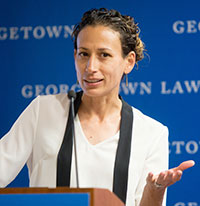 Thalia González is a professor of law at UC Law San Francisco and holds a Harry & Lillian Hastings Research Chair. She is faculty co-director of the Center for Racial and Economic Justice and writes extensively in the fields of restorative justice, education law, race and law, health justice, and social justice lawyering. A focal point of her interdisciplinary research and collaborative academic-community partnerships is the disruption of legal, political, social, and economic drivers of racial and gender disparities in public systems. Thalia has received grant funding from the Robert Wood Johnson Foundation, Grantmakers for Girls of Color, Annie E. Casey Foundation, and Atlantic Philanthropies and is an expert reviewer for federal agencies, national foundations, and numerous high-impact journals. Presently, she is co-chair, ABA Criminal Justice Section, Alternative Dispute Resolution & Restorative Justice Committee; vice chair, Board of Directors, Public Health Advocates; and a member of the Board of Directors, National Association of Community and Restorative Justice. She also serves on the Association of American Law Schools Executive Committee for the Section on Minority Groups. At UC Law San Francisco, Thalia is a senior scholar in the UCSF/UC Law SF Consortium on Law, Science & Health Policy and affiliated faculty member with the Center on Race, Immigration, Citizenship, and Equality, and Center for Social Justice. Since 2017, she has held an appointment as a senior scholar in the Center on Gender Justice and Opportunity at Georgetown University Law Center.
Thalia González is a professor of law at UC Law San Francisco and holds a Harry & Lillian Hastings Research Chair. She is faculty co-director of the Center for Racial and Economic Justice and writes extensively in the fields of restorative justice, education law, race and law, health justice, and social justice lawyering. A focal point of her interdisciplinary research and collaborative academic-community partnerships is the disruption of legal, political, social, and economic drivers of racial and gender disparities in public systems. Thalia has received grant funding from the Robert Wood Johnson Foundation, Grantmakers for Girls of Color, Annie E. Casey Foundation, and Atlantic Philanthropies and is an expert reviewer for federal agencies, national foundations, and numerous high-impact journals. Presently, she is co-chair, ABA Criminal Justice Section, Alternative Dispute Resolution & Restorative Justice Committee; vice chair, Board of Directors, Public Health Advocates; and a member of the Board of Directors, National Association of Community and Restorative Justice. She also serves on the Association of American Law Schools Executive Committee for the Section on Minority Groups. At UC Law San Francisco, Thalia is a senior scholar in the UCSF/UC Law SF Consortium on Law, Science & Health Policy and affiliated faculty member with the Center on Race, Immigration, Citizenship, and Equality, and Center for Social Justice. Since 2017, she has held an appointment as a senior scholar in the Center on Gender Justice and Opportunity at Georgetown University Law Center.
Emile Loza de Siles
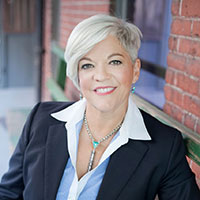 Emile Loza de Siles is assistant professor of law with the University of Hawai‘i at Mānoa, William S. Richardson School of Law where she teaches Artificial Intelligence and Social Justice, intellectual property, and real property. She serves on the Institute of Electrical and Electronics Engineers’ (IEEE’s) Artificial Intelligence Policy Committee and the inaugural Executive Committee of the AALS’ Section on Critical Legal Theories. She is also adjunct associate professor with the University of Maryland Global Campus where she teaches graduate cybersecurity courses. Since founding Technology Law Group in 2003, she has represented Cisco, HP, and numerous other innovators. She served with the U.S. Department of Commerce, Office of General Counsel, and the U.S. Federal Trade Commission (FTC). She clerked for Judge Sérgio A. Gutiérrez, Idaho Court of Appeals, and FTC Commissioner Sheila F. Anthony.
Emile Loza de Siles is assistant professor of law with the University of Hawai‘i at Mānoa, William S. Richardson School of Law where she teaches Artificial Intelligence and Social Justice, intellectual property, and real property. She serves on the Institute of Electrical and Electronics Engineers’ (IEEE’s) Artificial Intelligence Policy Committee and the inaugural Executive Committee of the AALS’ Section on Critical Legal Theories. She is also adjunct associate professor with the University of Maryland Global Campus where she teaches graduate cybersecurity courses. Since founding Technology Law Group in 2003, she has represented Cisco, HP, and numerous other innovators. She served with the U.S. Department of Commerce, Office of General Counsel, and the U.S. Federal Trade Commission (FTC). She clerked for Judge Sérgio A. Gutiérrez, Idaho Court of Appeals, and FTC Commissioner Sheila F. Anthony.
Professor Loza de Siles’ interdisciplinary scholarship on artificial intelligence (AI) and law emphasizes AI governance; AI biases and impacts associated with human-focused AI systems and uses; and AI impacts on social justice and the rule of law. She holds a B.S. in medical technology, an M.B.A., a J.D. from The George Washington University School of Law; and a cybersecurity strategy graduate certificate from Georgetown; and has further data science graduate studies at Harvard.
In 2023, she was awarded the Inaugural Margaret E. Montoya Estrella en Ascenso (Star in Ascension) Award by the LatCrit Board of Directors for her “inspiring scholarship and service to the causes foundational to LatCrit.”
In April 2023, Professor Loza de Siles traveled with five of her Artificial Intelligence and Social Justice students (all women and all but one women of color) to discuss and advocate for artificial intelligence legislation in 20 congressional meetings. More here. Among her current projects, she has forthcoming several articles, including to theorize a new form of slavery created by ungoverned AI systems and usages, and book chapters on artificial intelligence and biases in Impact Assessment of Artificial Intelligence Systems (Oxford Univ. Press) and in Research Handbook on the Law of Artificial Intelligence (2d ed., Edward Elgar Press).
Mariela Olivares
 Mariela Olivares is the associate dean of academic affairs and professor of law at Howard University School of Law. She teaches Torts, Immigration Law, Family Law, and a seminar on Domestic Violence Law. She also directs Howard’s Family Law Certificate Program. Professor Olivares has taught at the Catholic University of America Columbus School of Law and was a clinical teaching fellow at Georgetown University Law Center. Her professional and scholarly interests include the intersection of immigration law and policy and critical legal studies and immigration aspects of family law and domestic violence law, with a focus on family and child separation and detention. An expert in these fields, her work has been published in the Harvard Law Review Forum, the Georgia State Law Review, American University Law Review, the Harvard Latino Law Review, the Missouri Law Review, and the Nebraska Law Review, among others. She served as the Chair of AALS Minority Groups Section and has served on planning committees for other national organizations’ events. She was selected as an American Bar Foundation Fellow in 2019. Appointed by Governor Wes Moore in 2023, she is a commissioner on the Maryland Public Ethics Commission. Prior to law teaching, Professor Olivares litigated on behalf of domestic violence survivors in D.C. family court. The student body of Howard Law selected Professor Olivares as faculty member of the year in 2020.
Mariela Olivares is the associate dean of academic affairs and professor of law at Howard University School of Law. She teaches Torts, Immigration Law, Family Law, and a seminar on Domestic Violence Law. She also directs Howard’s Family Law Certificate Program. Professor Olivares has taught at the Catholic University of America Columbus School of Law and was a clinical teaching fellow at Georgetown University Law Center. Her professional and scholarly interests include the intersection of immigration law and policy and critical legal studies and immigration aspects of family law and domestic violence law, with a focus on family and child separation and detention. An expert in these fields, her work has been published in the Harvard Law Review Forum, the Georgia State Law Review, American University Law Review, the Harvard Latino Law Review, the Missouri Law Review, and the Nebraska Law Review, among others. She served as the Chair of AALS Minority Groups Section and has served on planning committees for other national organizations’ events. She was selected as an American Bar Foundation Fellow in 2019. Appointed by Governor Wes Moore in 2023, she is a commissioner on the Maryland Public Ethics Commission. Prior to law teaching, Professor Olivares litigated on behalf of domestic violence survivors in D.C. family court. The student body of Howard Law selected Professor Olivares as faculty member of the year in 2020.
Professor Olivares clerked on the Supreme Court of Texas. She received her LL.M. in Advocacy with Distinction from Georgetown University Law Center and graduated from the University of Michigan Law School where she was a Clarence Darrow Scholar and an executive editor of the Michigan Law Review. Professor Olivares graduated Phi Beta Kappa from the University of Texas-Austin with highest honors and special honors with degrees in Plan II Honors and Spanish literature.
Marisol Orihuela

Natalia Ramírez Lee
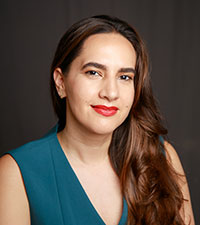 Natalia Ramírez Lee co-leads the Women’s Employment Rights Clinic (WERC) at Golden Gate University. Prior to joining the clinic, Professor Ramírez Lee was an employment litigator at two boutique employment firms in Oakland where her practice was focused on counseling and representing workers in complex wage and hour class and representative actions as well as individual retaliation, discrimination, and harassment cases.
Natalia Ramírez Lee co-leads the Women’s Employment Rights Clinic (WERC) at Golden Gate University. Prior to joining the clinic, Professor Ramírez Lee was an employment litigator at two boutique employment firms in Oakland where her practice was focused on counseling and representing workers in complex wage and hour class and representative actions as well as individual retaliation, discrimination, and harassment cases.
Professor Ramírez Lee has represented clients in state and federal court, arbitration, and administrative agencies. She has succeeded in trial and bringing and opposing motions for class certification, reconsideration, summary adjudication and summary judgment, approval of class settlements, motions to compel arbitration, and diverse discovery motions.
Prior to law school, Professor Ramírez Lee was the director of human resources for an environmental consulting company in Bogotá, Colombia. She also directed HIV prevention programs for immigrant women in New York City at the Dominican Women’s Development Center and the Latino Commission on AIDS. Professor Ramírez Lee earned her J.D. from U.C. Berkeley School of Law and her B.A. from Pace University.
Evelyn Rangel-Medina
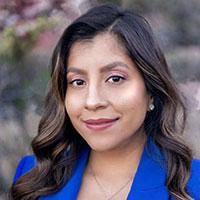 Evelyn Rangel-Medina is an assistant professor of law at Temple University James E. Beasley School of Law, where she teaches Criminal Procedure, Employment Law, Latinxs & the Law, and Citizenism: Race & Immigration. She was the inaugural visiting assistant professor of the Center for Racial and Economic Justice at UC Law San Francisco (formerly Hastings College of the Law). The current focus of her work investigates racial subordination and its various iterations, including identifying the myriad ways documentation status enforcement and national security policies discriminatorily impact citizens of color. More generally, her research and teaching interests lie primarily in the areas of race and the law, employment discrimination, criminal procedure, and crimmigration.
Evelyn Rangel-Medina is an assistant professor of law at Temple University James E. Beasley School of Law, where she teaches Criminal Procedure, Employment Law, Latinxs & the Law, and Citizenism: Race & Immigration. She was the inaugural visiting assistant professor of the Center for Racial and Economic Justice at UC Law San Francisco (formerly Hastings College of the Law). The current focus of her work investigates racial subordination and its various iterations, including identifying the myriad ways documentation status enforcement and national security policies discriminatorily impact citizens of color. More generally, her research and teaching interests lie primarily in the areas of race and the law, employment discrimination, criminal procedure, and crimmigration.
Professor Rangel-Medina graduated from Berkeley Law, where she was named an inaugural University of California Presidential Public Interest Law Fellow. She is an honors graduate from the University of Nevada, Las Vegas, where she attained three bachelor of arts degrees magna cum laude with departmental honors in English literature, Women’s Studies, and Political Science: Public Policy & International Relations. She previously worked as a managing director at United for Respect and Restaurant Opportunities Centers United (ROC United) advancing labor and employment advocacy campaigns and providing resources to low-wage workers.
Laura Riley
 Laura Riley is the director of the Clinical Program at Berkeley Law. She is an academic administrator and social justice attorney with experience in veterans law, disability, and women’s rights. Prior to joining the Clinical Program, she was associate professor of lawyering skills and assistant director of academic success at the University of Southern California Gould School of Law. There she developed and co-taught a Veterans Legal Practicum and co-chaired the DEI Faculty Committee. She has also worked as managing attorney for the Los Angeles County Bar Association, project director of Bet Tzedek Legal Services, staff attorney for California Women’s Law Center, staff attorney for Disability Rights Legal Center, and a clerk for the United Nations International Criminal Tribunal for the former Yugoslavia. Laura earned her B.A. from Barnard College, Columbia University and her J.D. from the University of Southern California Gould School of Law.
Laura Riley is the director of the Clinical Program at Berkeley Law. She is an academic administrator and social justice attorney with experience in veterans law, disability, and women’s rights. Prior to joining the Clinical Program, she was associate professor of lawyering skills and assistant director of academic success at the University of Southern California Gould School of Law. There she developed and co-taught a Veterans Legal Practicum and co-chaired the DEI Faculty Committee. She has also worked as managing attorney for the Los Angeles County Bar Association, project director of Bet Tzedek Legal Services, staff attorney for California Women’s Law Center, staff attorney for Disability Rights Legal Center, and a clerk for the United Nations International Criminal Tribunal for the former Yugoslavia. Laura earned her B.A. from Barnard College, Columbia University and her J.D. from the University of Southern California Gould School of Law.
Rachel Wallace

Rachel Wallace is the interim deputy director of the Policy Advocacy Clinic at Berkeley Law. She received a master of public policy degree from U.C. Berkeley’s Goldman School of Public Policy and completed her undergraduate studies at the University of Notre Dame. Her work in the Policy Advocacy Clinic as a faculty member has primarily included eliminating fees and fines for young people in the South and researching restitution and cash bail in California. Wallace’s policy interests include carceral justice system funding and monetary sanctions, as well as the intersection of re-entry and civic engagement/voting rights. She is passionate about mentoring law and policy students, addressing anti-Blackness and inclusion in clinical pedagogy, in and investing in the legal and policy pipelines of young women of color.